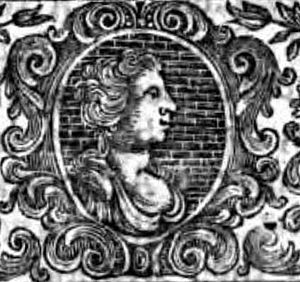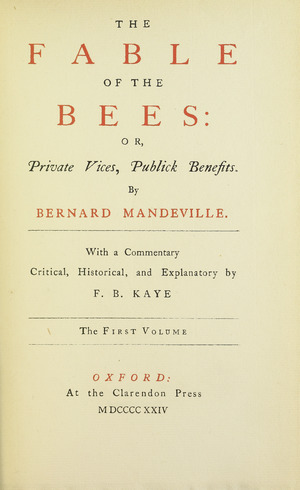Bernard Mandeville facts for kids
Quick facts for kids
Bernard de Mandeville
|
|
|---|---|

Portrait, possibly Mandeville,
from Free thoughts on religion |
|
| Born | 15 November 1670 |
| Died | 21 January 1733 (aged 62) |
| Era | 18th-century philosophy |
| Region | Western philosophy |
| School | Classical economics |
|
Main interests
|
Political philosophy, ethics, economics |
|
Notable ideas
|
The unknowing co-operation of individuals, modern free market, division of labour |
|
Influences
|
|
|
Influenced
|
|
Bernard Mandeville (born November 15, 1670 – died January 21, 1733) was a Dutch doctor, writer, and thinker. He was known for his ideas on how society works. Born in Rotterdam, he spent most of his life in England. He wrote many books in English. His most famous work is The Fable of the Bees.
Contents
Life of Bernard Mandeville
Bernard Mandeville was born in Rotterdam, in the Dutch Republic (now the Netherlands), on November 15, 1670. His father was a well-known doctor. Bernard was a very smart student. He wrote about medicine when he was just 15 years old. Later, he studied at Leiden University and became a doctor in 1691.
Mandeville moved to England to learn English. He became so good at the language that many people thought he was English. His father had some political trouble in Rotterdam, and Bernard might have been involved too.
As a doctor, Mandeville was well-respected. His writings were also very popular. He was good at talking to people and made friends with important figures like Lord Macclesfield. Mandeville died in Hackney, England, on January 21, 1733, at 62 years old. He died from the flu.
Mandeville's Writings
The Fable of the Bees
In 1705, Mandeville published a poem called The Grumbling Hive, or Knaves Turn'd Honest. This poem was about a community of bees. The bees were doing very well, but they were also a bit selfish. Then, they suddenly became completely honest and good. Without their desire for personal gain, their economy fell apart. The remaining bees went to live simple lives in a hollow tree. Mandeville used this story to suggest that if people don't have some "private vices" (like wanting things for themselves), society might not benefit.
In 1714, he published the poem again as part of a bigger book. This book was called The Fable of the Bees: or, Private Vices, Public Benefits. It included his poem, plus his thoughts on it, called Remarks. It also had an essay about how moral virtues started. The book was a way to comment on the politics of England at the time.
Later, in 1723, a new version of the book came out. It added two more essays. One essay was An Essay on Charity and Charity Schools. In this essay, Mandeville criticized schools that aimed to teach poor children to be good. He thought that bad desires weren't just in poor people. He also believed that educating the poor might make them want more material things. This would go against the school's goal and make it harder to help them. This idea caused a lot of debate and was even investigated for being "immoral."
Mandeville's Main Ideas
Mandeville's ideas were quite shocking at the time. Many people thought they were wrong and negative. His main point was that people's actions can't be simply divided into good or bad. He believed that what we call "virtue" (doing good things against your natural desires for others) could actually slow down a country's progress.
Instead, he argued that "vices" (actions done for selfish reasons) are what truly make society move forward. He thought that people's desire for luxury and personal gain led to new inventions and more money moving around. This, in turn, helped the economy and society grow.
Private Vice, Public Benefit
Mandeville famously said that "private vices are public benefits." This means that selfish actions, if managed correctly, can lead to good things for everyone. He believed that if people were too "virtuous" and didn't have any self-interest, society would become lazy and stop progressing.
His ideas were different from those of Adam Smith, another famous thinker. Both Mandeville and Smith believed that when individuals act, it can help society as a whole. But Smith thought this happened naturally through "virtuous self-interest." Mandeville, however, believed it was "vicious greed" that led to good outcomes. He also thought that politicians needed to be clever. They had to guide people's selfish desires so they would result in public benefits. He wrote in The Fable of the Bees that "Private Vices by the dextrous Management of a skilful Politician may be turned into Publick Benefits."
Mandeville also talked about the division of labour. This is the idea that when people specialize in different tasks, it makes work more efficient. Adam Smith later used some of Mandeville's examples in his own writings.
Mandeville's Influence
Even though Mandeville probably didn't mean to harm morality, his ideas about human nature were seen as negative by many. His other works, like A Search into the Nature of Society (1723), also surprised people.
Mandeville's ideas were praised by later thinkers like Friedrich Hayek and John Maynard Keynes. Keynes saw Mandeville as an early thinker who had similar ideas to his own about how the economy works. Karl Marx, another very important thinker, called Mandeville "an honest man with a clear mind." Marx liked Mandeville's idea that a society's wealth depended on workers being relatively poor.
See also
 In Spanish: Bernard Mandeville para niños
In Spanish: Bernard Mandeville para niños
- Fable
- Physician writer
 | Frances Mary Albrier |
 | Whitney Young |
 | Muhammad Ali |


